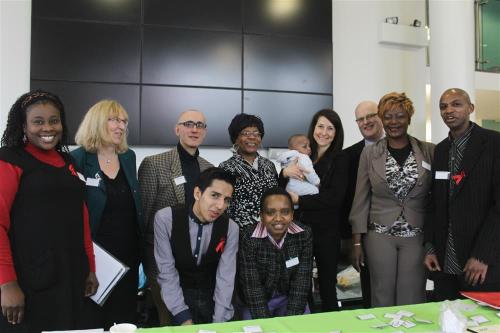
In the modern British workplace, you can’t be fired or discriminated against in any way on the grounds that you’re HIV positive. That would be a criminal offence. Notifying your employer isn’t a legal requirement, but if you do chose to disclose your status and are met with anything other than support, confidentiality and reasonable adjustments, then your employer has almost certainly broken the law.
Part of the Equalities Act 2010 was created to lessen its impact in employment and ensure disclosure wouldn’t jeopardise careers or future opportunities. Under the legislature, people with HIV cannot be treated less favourably under any circumstances. But thanks to the stigma and misunderstanding surrounding HIV, some have found it wholly ineffectual.
Had Shaun* stayed silent about his own diagnosis, he wouldn’t be fighting to save his career. “I have felt over the past two years that they were looking for ways to get me,” he says. For the last six years, Shaun has worked in the insurance department of a FTSE 100 British supermarket chain and has asked for anonymity as the situation is ongoing.
He received his diagnosis one Monday lunchtime in September of 2013. Disorientated, he returned to work the following morning, but by 9:30AM he found himself coerced into a meeting room while human resources tried to determine the cause of his visible distress. Despite his best efforts to resist disclosing his status – one he had barely begun to come to terms with – he was told he would be sent home if he refused to explain his discomfort.
“I felt forced. I wasn’t ready to say it myself, to anyone, never mind the HR person who I don’t really know,” he recalls. “I disclosed. She literally just went, ‘I’ll need to go and check whether I’ll need to tell all the first aiders.’ I was like, ‘I don’t even have to tell you, never mind anyone else.’ I got a message in the afternoon saying they had checked and they didn’t need to tell the first aiders.”
Shaun was under no legal obligation to disclose his status to anyone in his company. Six weeks later, they displayed an offensive level of ignorance around the subject.
“They took me into a room and told me they’d done some research and that if I cut myself at my desk, or in the building, to make sure that someone comes into the room and cleans it up,” says Shaun. “I believe my words were, ‘Well of course, if you were a negative person you would just lie in a pool of your own blood, wouldn’t you?’ That just angered me even more because where have they researched it? Where have they got that information from?”
The Equalities Act 2010 states employers are to make reasonable adjustments with regards to people living with HIV; the most common being time off for clinic appointments. Despite an attendance track record Shaun describes as “exemplary” (before his diagnosis he hadn’t taken sick leave since 2009), his employer began tracking his absences on a spreadsheet stored on the company server.
“My head of department wanted to know which appointments were not covered by the Equalities Act, with no details or explanation to me as to why they wanted that information,” explains Shaun. “I said, ‘You’re making me feel like you’re out to get me. And, allegedly, that’s not the case. I don’t believe them, but at the same time they said because I’m spending so many hours out of the business, they were trying to quantify how much work I had done.”
When he disclosed his status, Shaun was stunned by how little his employers knew about HIV – especially with regards to employment law. This was, after all, the well-resourced HR department of a FTSE 100 company; that they can brazenly display such ignorance – not to mention intolerance – and get away with it doesn’t bode well for people living with HIV who work in much smaller businesses.
Alice started working as a sales consultant at a London-based recruitment firm – a small company with five employees – four months after her diagnosis. Shortly after starting her medication she fell ill and decided to let her boss know, meeting up with him in a pub outside of office hours.
“It was just awful,” she says, recalling his reaction to her disclosure. “Straight away I could tell it was the wrong thing to do because his eyes widened and then he said, ‘When am I gonna get AIDS? When am I gonna be ill?’ He started to freak out and then said he needed to change the contract because if I fell over he was going to be sued. He said, ‘Why the hell didn’t you say? I think it’s so unfair that you didn’t say.’ I thought he would thank me for telling him and maybe be a bit shocked. I was speechless.”
The conversation lasted around 40 minutes, with topics ranging from the potential dangers of sharing cups and cutlery in the office (there aren’t any dangers), the jokes he had previously made about people with HIV in the office (which he then denied making), the fact he needed her parents’ number in case anything happened to her (he didn’t) and his anger that he wasn’t told sooner.
The discussion finished constructively with a promise that he’d put together a workable plan. She never made it back into the office. Instead, she received an email stating that she’d failed to pass her probation and wouldn’t be kept on. Compared to a previous conversation Alice had with him, it made for a sharp change of direction.
“He honestly was like, ‘You’re gonna make loads of money,'” says Alice, considering their relationship prior to his disclosure. “We were working really closely together, starting to do other projects.”
While Shaun and Alice have faced difficulty from their employers on account of their HIV status, Jayce Carberry, 26 from Medway, Kent, suffered from the prejudice of his clients. He received his diagnosis in 2012 and at the time was working as a freelance hairdresser. When the rumours about his diagnosis started to spread through his relatively small hometown, he chose to own the situation and address them with a Facebook status.
“I was doing really well and I was busy all of the time,” says Carberry. “I text to confirm appointments, and [after my Facebook status] I would get a text or a phone call back saying, ‘I read on Facebook about your HIV and I don’t really feel comfortable with you cutting my hair.’ I would say I lost a good 40 percent of my client base.”
The most common reason his clients abandoned him was their irrational fear of what would happen if he cut himself on his scissors and they came into contact with his blood (very little, is the answer). With a sharply diminished client list, he tried to return to a salon he previously worked at and invested in. He was told hiring him “would be a risk to the reputation of the salon”. He had previously left the salon on good terms and the owner was supposedly a friend.
“I gave up hairdressing. It was demoralising with all that going on,” he says. “I got really depressed about it and hid away from the world for a couple of months and lived off my savings for a while. And then I went to sign on. I had no other option.” Carberry has since moved to Brighton. As well as setting up a blog detailing his journey, he now manages a sexual health website for the METRO Charity.
There’s a definite sense that fighting, even if you’re on the right side of the law, is difficult, if not impossible. While Shaun may yet find himself in an employment tribunal, Alice chose to avoid a lengthy and expensive trial. As Jayce Carberry was self-employed, he has no case at all.
Legal fees, time constraints, lack of evidence, ignorance around employment rights – the reasons why HIV discrimination in the workplace often goes unpunished and underreported are numerous. But the stigma and misunderstanding of HIV is what enables the law to continually be undermined. Until companies – and the general public – gain better knowledge of what the virus is, these stories will sadly continue to repeat themselves.
Is your workplace ready?
Did you know we can offer training for your employer or for your workforce?
*Name changed to protect identity
These articles may also interest you
 Marks & Spencer found to have harassed and victimised female worker who contracted HIV
Marks & Spencer found to have harassed and victimised female worker who contracted HIV
 Working with HIV: A Fading Taboo?
Working with HIV: A Fading Taboo?
 Living with HIV: public knowledge must catch up with science
Living with HIV: public knowledge must catch up with science
Thanks for reading, let us know what you think in the comments below, or you can find us on Facebook, Twitter or Instagram!

















